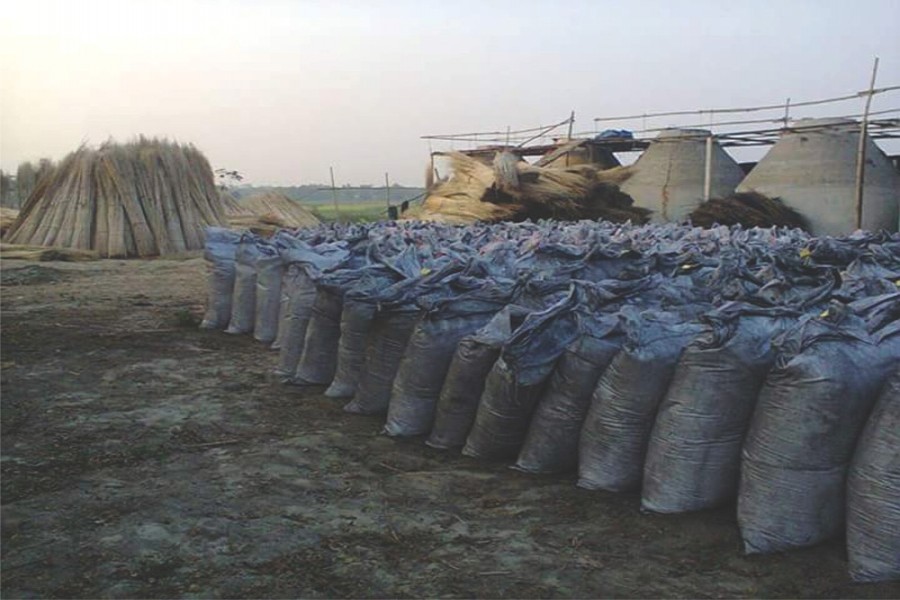
Published :
Updated :

Jute has been a driving force for Bangladesh's economy for several decades. Despite a decline in the global demand for it around the late 2000s, jute is still one of the main crops in rural Bangladesh. Approximately 30 million people are directly and indirectly involved with the cultivation, processing, transportation and conversion of this crop.
One of the by-products of jute is the jute-sticks. These are dried at yards of households in villages, to be later used as firewood for earthen stoves. Some sticks are also used in making fences. As these sticks burn fast, they have no vital role as fuel. The ashes are used to wash utensils. However, there is a significant demand for jute-stick ash globally.
The ash is used as raw material in many industries including charcoal. Charcoal is a hard black substance that can be used as fuel. Activated carbon is produced from charcoal following an industrial process.
Ash is used to produce tooth-cleaning products, anti-toxin drugs, carbon paper, computer ink, face-wash, dry-cell batteries, dried ink of photocopier machines and other chemicals. Ash is widely used for water filters and in gas masks. It is also used to remove odours.
The ashes are made by setting on fire moisture-less jute-sticks at a specific temperature in special containers which are heated at high temperatures. Once burnt, the ashes are then pulverised into jute-stick carbon powder. At present, jute charcoal is being produced at mills in Jamalpur, Narayanganj, Rajshahi, Pabna, Rajbari, Faridpur and Khulna districts.
According to industry insiders, jute-stick charcoal dusting powder production began in Bangladesh around 2012. It was initiated by a local tradesman with the assistance of a Chinese national who showed him the way to produce jute-stick ash and export it to China initially. Over the next few years, many factories have been set up.
At the moment, the country produces around three million tonnes of jute-sticks annually. As stated by an industry insider, if the use of even 50 per cent of the jute-sticks can be confirmed, it can lead to the manufacture of 0.25 million tonnes of charcoal. This will be worth Tk 250 billion a year.
If half of the total product can be used to produce ashes, $3 to $3.50 million will be the revenue. The government itself will make around Tk 400 million from this as taxes. Besides, such an industry will create jobs for more than 20,000 people directly and two million people indirectly.
The prospects for exporting jute-stick ashes are impressive, with China being a large market. In fiscal year 2015-16, Bangladesh earned Tk 140 million by exporting jute charcoal to China alone. Bangladesh also gets duty-free market access to China in case of jute-stick carbon. Taking advantage of this access, the quantity of charcoal export to China can be doubled.
Around 3,000 factories in China require charcoal. The smallest factory needs there are around 3,000 factories which require a huge volume of charcoal. A tiny factory needs at least 100 tonnes of carbon (charcoal) monthly for production. A tonne of charcoal has prices between $ 800 and $ 900.
China is followed by Taiwan and Brazil in terms of volume of jute charcoal import from Bangladesh. There are wide ranges of demand for ashes in different countries. Korea, Japan, Malaysia, Hong Kong, Turkey, UAE, Germany, the United States, Australia, Canada and Mexico also have demand for charcoal dust powder from our jute-stick factories. If international standard quality can be maintained, the price can be very competitive.
But there are some obstacles to the industry. While transporting jute-stick ashes in containers last year, there were four incidents of fire. Since then, most vessels do not want to carry jute-stick ashes. As a result, the export is facing some problems.
Some exporters are planning to meet the concerned minister to resolve the problem. Hopefully the stalemate will pass soon as the government is providing special focus on this sector after labelling it as 'Green industry'. The Bangladesh Bank has already issued a notification declaring 20 per cent cash incentives for the exporters of jute charcoal.
If provided more support, the sector can grow and contribute by bringing in more foreign currency.
Dr. Md. Ruhul Amin is a Senior Assistant Vice-President of Islami Bank Bangladesh Limited.


 For all latest news, follow The Financial Express Google News channel.
For all latest news, follow The Financial Express Google News channel.